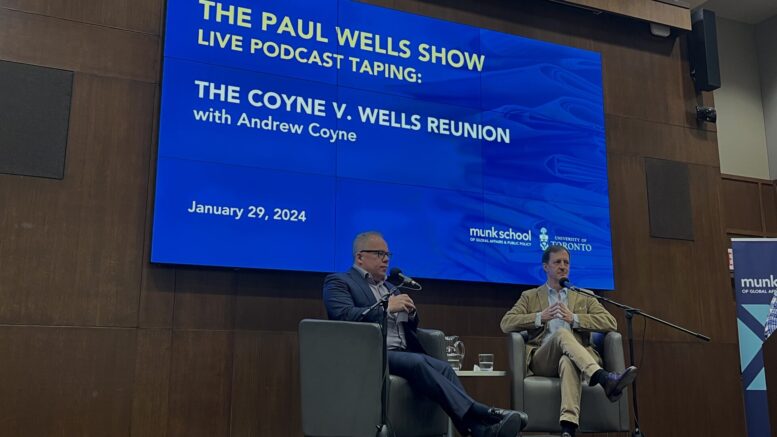Globe and Mail columnist Andrew Coyne said media in Canada “should be moving away from the subsidy model,” as recent economic challenges have emerged due to public subsidies that jeopardize the industry’s ability to remain viable.
Canadian political journalist Paul Wells hosted a live taping of The Paul Wells Show on Jan. 29 at the University of Toronto Munk School of Global Affairs and Public Policy with Coyne as his guest. Among other issues, they discussed government subsidies for Canada’s struggling media sector.
“It doesn’t fix our problems. It makes our problems worse,” said Coyne.
Concerns about the reliability and independence of journalists producing government-funded news have been raised by some Canadians amid increased funding for Canadian news media.
Annual appropriations from Parliament have long been used to help fund CBC/Radio Canada. Its journalistic independence is protected in the Broadcasting Act.
With the recent impacts of Bill C-18 (The Online News Act), media organizations all over the country have faced a challenging shift in the access to their news content. Following the Canadian government’s proposed ramifications, which required large tech companies such as Meta to pay to distribute Canadian news media content on their platforms, Meta ultimately restricted access to Canadian news outlets on Facebook and Instagram.
Google, on the other hand, reached a deal with the federal government and has agreed to pay news companies about $100 million a year.
But Coyne said news corporations such as the CBC would gain advantages from establishing a more direct connection with its audience through a user-pay model.
“(CBC) would have a much more direct relationship with its audience and get itself out of a lot of problems,” he said.
Coyne highlighted how online giants like Google and Facebook once freely sent millions of readers to organizations’ pages and acted as an “enormous revenue advantage” for online news and media.
“Over time… we’ll just sink further and further into this idea that everybody should be subsidized,” he said.
“In a time when our credibility and our independence is being questioned, it’s the very worst thing that could happen.”
During the live taping of “Wells v. Coyne,” the journalists also discussed Canada’s next federal election, the country’s economic situation and other political issues.

